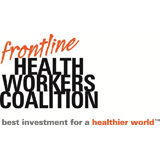
Community Health Worker Maya Adunutalwar provides care at home for a mother and her newborn in her village of Rajgattachak, India. Photo: Andy Hall / Save the Children
A new and diverse coalition of 15 major global health organizations – including the Bill & Melinda Gates Foundation, Save the Children, and World Vision – is calling on the U.S. government for more strategic investment in frontline health workers in the developing world as the most cost-effective way to save the lives of mothers and children, address AIDS and other global health threats, and help advance U.S. economic and strategic interests.
The Frontline Health Workers Coalition, which launched today with the release of a new report focusing on the need for frontline health workers, is calling on the U.S. administration to train and support an additional 250,000 new frontline health workers — and to better support the capacity and impact of existing workers where the need is greatest.
Frontline health workers are often the only link to health care for millions of children and their families in the developing world who live beyond the reach of hospitals and clinics. These workers — mostly community health workers and midwives, but also doctors and nurses who may be serving at the community level — and can provide families with a range of proven, life-saving services including maternal and newborn care, child health, and management of chronic and communicable diseases, such as tuberculosis, AIDS and diabetes. Yet according to the World Health Organization, there is a global shortage of at least one million frontline health workers.
“The world has experienced dramatic declines in deaths thanks largely to the care provided by these local health heroes,” says Mary Beth Powers, chair of the Coalition. “But despite this progress, nearly 21,000 children still die every day, most from preventable causes, and 1,000 girls and women die each day in pregnancy and childbirth. Investing in the technologies and medicines to prevent and treat diseases is important, but insufficient. Simply put, without health workers to deliver the life-saving medicines and information, there is no pathway to good health.”
The new Coalition report documents why frontline health workers are a good investment, including:
- Frontline health workers are the backbone of effective health systems and the only way to serve millions of families who live beyond the reach of hospitals and clinics;
- Frontline health workers are relatively inexpensive to train and support. It can cost as little as $300 to train a frontline health worker in crucial lifesaving skills;
- Frontline health workers are less likely to migrate from their communities to search for higherpaying jobs;
- Frontline health workers are trusted in their community and deliver services in synch with local needs and cultural beliefs, and can help ensure care reaches those who need it most;
- In countries – such as Ethiopia, Bangladesh and Nepal — where public and private investments to strengthen frontline health workers have been made, deaths due to preventable causes have decreased and populations are healthier and population growth rates are slowing; and
- Investing in health in developing countries can also help advance U.S. strategic interests by building more stable, prosperous communities.
Additionally, eight corporations are coordinating with the new Frontline Health Workers Coalition to
bolster the private sector’s ongoing work to increase the number of trained health workers, improve
retention rates among existing health workers, and enhance the capacity of existing health workers.
- In the news: Coalition promotes investment in health workers
- Video: Watch the story of Elizabeth Mpunga, a nurse midwife in Tanzania trained by JHPIEGO.
- Video: Watch the short film, Projahnmo – Generations to Come, a groundbreaking research study in Bangladesh that reduced newborn deaths by one-third through home-based newborn care
- Video: Watch the Living Proof video showcasing Female Community Health Volunteers saving lives in Nepal
- Visit the Frontline Health Workers Coalition website to learn more